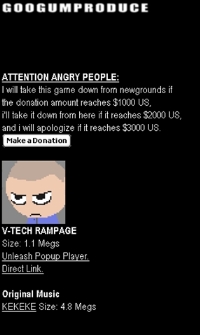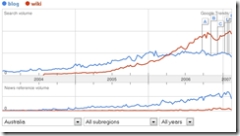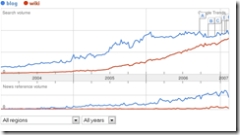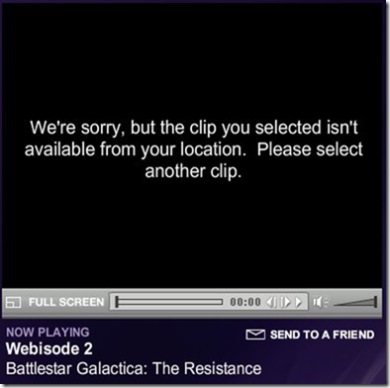Home » australia (Page 43)
Category Archives: australia
Academic Ethics, Privacy and Transparency … all coming soon to YouTube!
Australia’s QUT has been in the grip of a very public controversy recently which dovetails between issues of freedom of speech, academic ethics and the transparency of university processes. The controversy came to light and media attention on 11 April this year when two QUT academics, John Hookham and Gary MacLennan, published an article in The Australian entitled ‘Philistines of relativism at the gates’. In it, Hookham and MacLennan very publicly took issue with the ethics of work being done by PhD candidate, Michael Noonan:
A time comes when you have to say: “Enough!”, when you can no longer put up with the misanthropic and amoral trash produced under the rubric of postmodernist, post-structuralist thought. The last straw, the defining moment, came for us when we attended a recent PhD confirmation at the Queensland University of Technology, where we teach. Candidate Michael Noonan’s thesis title was Laughing at the Disabled: Creating comedy that Confronts, Offends and Entertains. The thesis abstract explained that “Laughing at the Disabled is an exploration of authorship and exploitation in disability comedy, the culmination of which will be the creation and production (for sale) of a six-part comedy series featuring two intellectually disabled personalities. “The show, entitled (Craig and William): Downunder Mystery Tour, will be aimed squarely at the mainstream masses; its aim to confront, offend and entertain.” (Editor’s note: the subjects’ names have been changed to protect their privacy.) Noonan went on to affirm that his thesis was guided by post-structuralist theory, which in our view entails moral relativism. He then showed video clips in which he had set up scenarios placing the intellectually disabled subjects in situations they did not devise and in which they could appear only as inept. Thus, the disabled Craig and William were sent to a pub out west to ask the locals about the mystery of the min-min lights. […]
At the seminar we were told there was a thin line between laughing at and laughing with. There is no such thin line. There is an absolute difference that anyone who has been laughed at knows. We must admit with great reluctance that at the seminar we were alone in our criticism of the project. For us, it was a moment of great shame and a burning testimony to the power of post-structuralist thought to corrupt. It is not our intention here to demolish the work of Noonan, an aspiring young academic and filmmaker. After all, ultimate responsibility for this research rests with the candidate’s supervisory team, which included associate professor Alan McKee, the faculty ethics committee, which apparently gave his project total approval, and the expert panel, which confirmed his candidacy. […]
What we have instead is the reality that cultural studies is in the grip of a powerful movement that we call the radical philistine push. It is this same movement that has seen the collapse of English studies and the consequent production of graduates who have only the scantiest acquaintance with our literary heritage. It is also undermining the moral fabric of the university.
So, what starts with ethical questions about a particular thesis, quickly becomes a much more generic complaint about the corruption of education by poststructuralist and postmodern theory and approaches. I know nothing of the people writing or mentioned in this article, but have to say after reading the piece I wasn’t swayed; my sympathies were more with Michael Noonan than anyone else, because as a PhD candidate I know I would have been almost destroyed by such public denouncing of my work. This, I should add, is not a comment on the quality on the work being or proposed – I know nothing beyond the article above and the surrounding debate, and haven’t seen any of the footage mentioned – but rather a comment on the process and the reasonable expectation that any criticism of a candidate’s work be handled within the university as long as possible. I’m not saying there is never a case for ‘going public’ with dismay about certain research, but from what I’ve read I believe Hookham and MacLennan took that step far too early. More to the point, combining criticism of a specific project with a very generic attack on a particular body of theory and its influence on teaching seems a less than generous way of dealing with the work of a PhD candidate.
The issues raised here also beg serious questions about transparency and universities. There is a lot of talk about the need to transparency of research outcomes since (most) Australian universities are at least partially publicly-funded. I quite agree with that notion. However, I think the idea of the processes of a university being taken public under the rubric of transparency tend to skew what makes it into the public arena. Selectively releasing aspects of a process (such as an ethics review process and confirmation of candidature) around research which clearly relies on careful contextualisation is bound to produce a one-sided picture. Tellingly, when Hookham and MacLennan’s article was republished in Online Opinion, the were comments from a student – using the handle WWSBD – who’d had Noonan (the candidate) as a lecturer, praising his efforts to educate student about people with disability. Moreover, this is the only place I’ve seen Noonan himself comment publicly:
I am at the student at the centre of Hookham and MacLennan’s attacks.
I thank WWSBD for understanding and appreciating my work in its context. I appreciate the words of Anecdote, who understands that a work must be seen and placed in context before it should be attacked. And I am disappointed for bedwin, who has lost all respect for me on the basis of an uninformed and incorrect article.
Much has been assumed about my project, my integrity and my intentions. Very little of it is based on truth. The simple facts are these: the excerpts I showed at my PhD confirmation seminar were presented in the context of exploring and discussing issues of authorship and representation in disability. My project seeks to empower the disabled, to give them a voice through comedy. Each clip was prefaced with my own thoughts about whether or not this had been achieved.
As a sessional staff member at QUT, I can think of nothing more deplorable than attacking a student’s incomplete research in a public forum. Hookham and MacLennan have made no effort to read my PhD confirmation document (it was offered) and they rejected my attempts to meet and discuss their concerns.
To date I have not sought to respond to their attacks in print. But I refuse to be further bullied and vilified before the public, my peers and my students.
However, the story doesn’t end there. Earlier this month The Australian report that Hookham and MacLennan are now facing a disciplinary hearing at QUT for their public comments, with the university arguing that the two unfairly attacked the candidate and his supervisory team. Now, whatever their views, Hookham and MacLennan seem to have a reputation as inspirational teachers themselves, and the news of their censure galvanized some of the QUT student body to defend their actions on the basis of free speech. The student campaign is visible through it’s “Save Our Lecturers” MySpace page. Moreover, over at Martin Hirst’s blog, he has posted ‘Freedom of Speech disabled at QUT’ which points to this documentary which is now available at YouTube:
(Hirst is a friend of Hookham and MacLennan’s, and his post also contains the full text from Hookham and MacLennan’s original article in The Australian, as well as some additional commentary from The Australian and subsequent letters to editor.)
The YouTube documentary clip, by QUT student Adrian Strong, is very compelling; Hookham and MacLennan both come across as intelligent, compassionate teachers and academics who have good cause for concern. My point here is not to judge the debate being documented in this clip – although I imagine it would be extremely compelling for many people. Rather, in the era of participatory culture and digital media, this clip is indicative of a very profound change which can see debates and arguments that once would have remained closed suddenly being open to public viewing and public debate. In such an era, digital literacy is extremely important – the ability to create, edit and share such a clip is a key part of the ability to make a case in the public eye. It’s no surprise that QUT, which has Australia’s most renowned Creative Industries faculty, should be the source of the first such debate in Australia (to my knowledge, at least).
Illustrating my point, I just noticed another posted by the same YouTube user who posted the clip above (and thus, I presume, also be Adrian Strong) which talks in even stronger terms about a perceived campaign of censorship at QUT:
(Again, let me reinforce, I don’t know enough about the other things going on to really judge this debate, but I do know that the perception of censorship certainly doesn’t add to the reputation of any university. However, like the first clip, without any further rebuttal, this clip is likely to be very persuasive to viewers.)
Update: In ‘Dissenting dons out in the cold’, Andrew Fraser reports in The Australian that the saga ended with Hookham and MacLennan both being suspended without pay for 6 months from QUT.
Searching Blogs Vs Wikis – Australians Prefer Wiki (The World Prefers Blog)
I was playing with Google Trends and their comparison function and noticed that you can now limit searches to regions (ie just Australia, for example). I was playing around looking at the comparative popularity of ‘blog’ versus ‘wiki’ and found something interesting: cumulatively, global searchers are still typing in ‘blog’ more, but in Australia, ‘wiki’ is a more popular term, and has been since the third quarter of 2006. Since there’s no scale on Google Trends, I’ve no numbers attached to these trends, but the results are interesting nevertheless.
Australia is looking for wikis…
While the world is looking for blogs…
[Click either image to expand.]
I’ve no idea why wikis are more popular in Australia … perhaps something to do with Wikipedia? I note in the News trends (the smaller bottom graph), blogs are still mentioned a lot more in the mainstream media. I wonder what it is about wikis and Aussies?
V-Tech Massacre: Tasteless Videogame based on the Virginia Tech Massacre
 A 21-year old Sydney man, Ryan Lambourn, has sparked outrage by creating a game based on the Virginia Tech Massacre. The game, called V-Tech Rampage, is far from technically impressive, but has nevertheless understandably upset quite a few people. One of the real difficulties is that while there have been a number of important political games and simulations which have tried to ‘speak’ about political issues (from September 12 to Donkey John to World Without Oil) this game – if it does have a point – really doesn’t make that clear. Over at Joystiq, the creator of the game based on the Columbine Massacre is quoted, citing his disappointment with the V-Tech game:
A 21-year old Sydney man, Ryan Lambourn, has sparked outrage by creating a game based on the Virginia Tech Massacre. The game, called V-Tech Rampage, is far from technically impressive, but has nevertheless understandably upset quite a few people. One of the real difficulties is that while there have been a number of important political games and simulations which have tried to ‘speak’ about political issues (from September 12 to Donkey John to World Without Oil) this game – if it does have a point – really doesn’t make that clear. Over at Joystiq, the creator of the game based on the Columbine Massacre is quoted, citing his disappointment with the V-Tech game:
Danny Ledonne, creator of Super Columbine Massacre RPG, writes on Lambourn’s site, “It would appear to me that Ryan has no intention of doing much other than making money and gaining immediate recognition after the Virginia Tech shooting. Inevitably, comparisons between SCMRPG and VTech Rampage are being made right now. Some bloggers despise both games equally whereas others recognize a level of commentary that SCMRPG attempted which was not evident in VTR. For myself I wish to point out that SCMRPG was never a for-profit endeavor and thus I never posted statements like that which is on the VTR game’s homepage”
Adding fuel to the Lambourn posted a notice say he would only remove the game if he received $2000 in donations. This sparked even more vitriolic comments on the game, but in those comments Lambourn defends the donations statement, say it was a further aspect of satire:
PiGPEN – May 15th 2007
Danny, the donation thing is there as a joke against all the people commanding me to take my game down. I didnt think anyone would donate money to it and so far my paypal account has proven me right (BUT I COULD USE SOME FUCKING MONEY THANKS!).
And i’d appreciate if you didnt use the name “Ryan”. That name is reserved for my close friends and family… i cant help the people that gleaned personal information from my website but i would hope you would have the courtesy to not disrespect me in such a manner on my own website…Danny.
Of course, the irony of courting controversy and then being surprised when it results in negative public sentiment (and the post of Lambourn’s full name, address and phone number in numerous locations online) is pretty thick. On the web, even thought two wrongs don’t make a right, they’re never far from each other!
See The Age for more details.
Update (17 May, 2:25pm): The ‘official’ version of the game hosted by Lambourn (and this whole website) have been taken down. (That said, given the nature of digital culture, if anyone looked I’m sure they’d find another copy somewhere…) Lambourn’s website now sports a “This Account Has Been Suspended” notice.
Update 2 (4 June 2007): After reviewing the case, Australia’s Office of Film and Literature Classification gave the game an MA15+ rating, not banning the game as had been suggested.
Gail Jones shortlisted for the Miles Franklin Award
 A huge congratulations to my UWA colleague, Gail Jones, on being shortlisted for this year’s Miles Franklin award for her new book Dreams of Speaking; Vintage (Random House Australia). Her competition this year is pretty impressive, too: Careless by Deborah Robertson; Carpenteria by Alexis Wright; and Theft: A Love Story by Peter Carey.
A huge congratulations to my UWA colleague, Gail Jones, on being shortlisted for this year’s Miles Franklin award for her new book Dreams of Speaking; Vintage (Random House Australia). Her competition this year is pretty impressive, too: Careless by Deborah Robertson; Carpenteria by Alexis Wright; and Theft: A Love Story by Peter Carey.
The winner will be announced on June 21st.
24 Hours of Flickr
Today 05.05.2007 (which is one of those lovely dates which makes sense on both US and normal people’s calendars), photography sharing and community building uber-site, Flickr, is running an event called 24 Hours of Flickr. The details:
To celebrate this global community, we invite you to join us in “24 Hours of Flickr” – a day-long global photo project. On May 5, 2007, grab your camera and whatever else you need, and chronicle your day in pictures. The group’s photos will be featured at Flickr events around the world this summer and in a companion book, which will contain a selection of photographs chosen from the group…
While the day is just beginning in the US, it’s well into the night here in Perth. I’ve remembered to carry my camera some of the day, but a lot of what I did wasn’t photography-friendly (I didn’t think taking pictures in the screening of Spider-Man 3 would be overly well received!). I’ve taken a few shots of my day in a set here. Thankfully, the paucity of shots today meant is was rather easy picking my one decent shot for the Flickr pool. The only better candidate was a photo of Emily’s work-in-progress painting of Tulips, but I it seemed wrong to post a photograph of a painting for a photography pool! So here’s the image I settled on …
It’s called Wrecked Angles (oh, I do love a good pun); it’s all rectangles, unfinished painted walls, security-wired windows and cracked glass. And yet, in black and white, aesthetically quite fascinating. (It was taken in Subiaco, Western Australia, but by no means indicative of the suburb!) It doesn’t really look that impressive scaled down, but take a look full-size and see what you think.
I can’t wait to see what other photos emerge during the day! 🙂
“We’re sorry, but the clip you selected isn’t available from your location:” Watching Battlestar Galactica in Australia and the Tyranny of Digital Distance
I just submitted an abstract for the Media International Australia special issue ‘Beyond Broadcasting: TV for the Twenty-first Century’. Here it is:
“We’re sorry, but the clip you selected isn’t available from your location:” Watching Battlestar Galactica in Australia and the Tyranny of Digital Distance
[Figure 1. Screen-capture from http://www.scifi.com/battlestar/, 11 September 2006]
In the late 1960s, conservative Australian historian Geoffrey Blainey coined the term “the tyranny of distance” to describe how the geographic gap between Australia and the centres of the Western world (US, UK) played a fundamental role is shaping the Australian psyche and character (Geoffrey Blainey, The Tyranny of Distance, Sun Books: Melbourne, 1966). Thirty something years later and the world is far more widely considered a global village; the world wide web, email and a million other applications have made real-time information-heavy communication and commerce the norm. However, while information transfers have made ‘distance’ much less of a concern in a number of ways, many policies, practices and systems of commerce still operate as though they are centred on goods moving at the speed of physical shipping, not allowing for information moving at the speed of light down a copper or optical wire. In an era when ‘the tyranny of distance’ means so much less in many contexts, this paper will argue that in the multimedia markets of contemporary society there is, rather, a prevailing tyranny of digital distance which marks out those areas of communication and commerce in which the potential and, indeed, expectation of synchronous global culture (at least for English-speaking countries) leads to constant state of confusion and annoyance – on both personal and legal levels – when those expectations are not met.
The North American-produced television series Battlestar Galactica, re-imagined for the twenty-first century (from an original 1970s series), has consistently been at the cutting edge of television and cross-media. Executive producer Ronald D. Moore and the Battlestar team utilise not just blogs and production-side video-blogs, but also create episodic commentary podcasts, make deleted scenes available online, and have even put two full episodes online for free for viewing. Likewise, Battlestar was one of the first shows available via Apple’s online iTunes Store. Given the amount of extra online content, and the show’s science fiction genre, Battlestar has a large and very active fan community who consume both the television show itself and the officially produced extra material, as well as actively creating and discussing their own derivative ‘fannish’ works ranging from blog commentaries to fan-created videos. Thus, when the show’s producers launched a series of 3 to 4 minutes ‘webisodes’ to re-build interest in the show prior to the launch of its third season, fans across the (wired) globe were understandably excited. However, when citizens of Australia, the UK, Canada or any other country outside the US tried to view these webisodes, they were met with a notice saying: “We’re sorry, but the clip you selected isn’t available from your location.” The owners of Battlestar (NBC) elected to restrict these webisodes to residents of the US only. This decision upset fans across the global Battlestar audience, with US fans quickly circumventing the restrictions and passing copies of the webisodes to their international fellows. In this paper, I will contend that this moment typifies the tyranny of digital distance, exemplifying the legal, ethical and practical issues raised when a globally-promoted television series ‘centres’ on a single national audience. I outline the difficulties of ‘watching’ Battlestar from Australia, and argue for distribution modes which are more in keeping with the technological (and fan-led) potential of digital distribution.
As you might imagine, this paper will draw together my previous thinking about the tyranny of digital distance which you can read about here and here. I’m also finishing off another Battlestar-related paper that stopped being written for a year, but is now being finished off for a new collection. It’s going to be a busy month, but I’m hopeful both of these will be well polished before Emily and I get married on June 9th (presuming this abstract is accepted). Wish me luck!
Update (8 May 2007): The abstract has been accepted! Thankfully, though, full papers aren’t needed until August 1st so I’ll be writing this after Emily and I return from our honeymoon (in Venice!!) :).
Update 2 (21 September 2007): The full version of this paper has been accepted after peer review, and will appear in Media International Australia issue 126, which is scheduled to be released in February 2008.
Update 3 (26 March, 2008): You final version of this paper has appeared, and you can read it following the link from this post.




